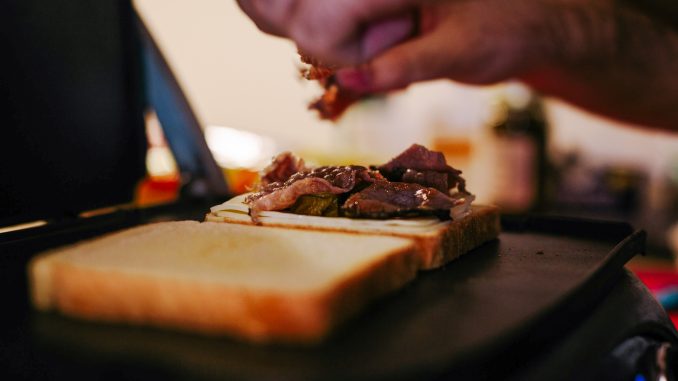
To be an entrepreneur, Brandon Study said you have to be willing to go without sleep.
“I’m even still learning,” he said. “It takes a very special type of person.”
Study, a senior entrepreneurship major, started Into the Nations, a non-profit focused on helping artisans in underdeveloped countries form profitable businesses.
He also launched a Kickstarter campaign for his clothing line Understand Your Brand in July and raised more than $6,000 by the end of August, exceeding his original goal of $3,675.
Other students like Study have created their own businesses, some based in other continents and others in dorm rooms. Some have taken advantage of resources like the Blackstone LaunchPad and Fox School of Business’s Innovation and Entrepreneurship Institute (IEI).
Neha Raman, a junior finance major, used Blackstone to transform an idea she thought of during high school into a full-fledged company.
Raman is the creator of Rungh, a customizable nail polish kit. She has competed in competitions like College Pitch Philly and the Be Your Own Boss Bowl, in which she came in second on the undergraduate track, winning $10,000.
“I think the best part about Temple is students are so open minded and creative and I think by having people from many different backgrounds and very different exposures in life, kind of plays on to the advantage here,” Raman said. “Temple is such a great place where people can act creatively.”
Julie Stapleton Carroll, program director of Temple’s Blackstone LaunchPad, said Temple students are “real go-getters.”
Blackstone is a campus-based entrepreneurship program located on 20 colleges across the country and three in Ireland. Through grant-funded support and mentorship for students, Blackstone LaunchPad helps students, faculty and alumni get their venture started.
“We get the gamut of ventures, businesses, ranging from an app on how to find a great party on campus to a vegan food truck,” Stapleton Carroll said.
The types of ventures that come through Blackstone vary through industries like technology, food and beverage, service and retail.
Currently, 40 percent of the startups come from Fox students, but every school in the university is represented, Stapleton Carroll said. She added that several of the companies that come through are minority-owned and women-owned.
Blackstone is not affiliated with the Fox school and “very purposefully so,” Stapleton Carroll said, because the organization wants to appeal to all types of students.
“What they are producing is their brand so helping them understand or see their career path more innovatively and entrepreneurially is one of our focuses,” she said.
This year, they plan to host an event to help international students with their startups.
“We have many international students here and they are not clear on what the flexibility is with their visa, what the laws and regulations are with how much money they can make,” Stapleton Carroll said. “They come with a lot of questions and I have a lot of questions too, so we can learn as much as they do in these talks.”
Ellen Weber, the executive director of IEI, said “inspiring” is on her daily to-do list. IEI helps aspiring entrepreneurs form, test and launch ideas through opportunities like workshops, networking events and an annual “idea competition” amongst students.
Students starting their own businesses on campus don’t surprise Weber — she said their creativity “fits into the culture of Temple.”
“The grit that underlies Temple students is the grit entrepreneurs need,” she added.
Weber said the “hands-on” aspect of the entrepreneurship courses Temple offers reflects the nature of the students’ future career path.
Blackstone takes an alternative approach by implementing the Socratic method and asking questions, not telling the student what they think of the idea. The organization also hosts events and brings in speakers to discuss legal issues like intellectual property or other topics like social media marketing, research and financial modeling.
Some students take initiative without utilizing the on-campus resources, like Jake Hymson, a sophomore management information systems major who started a sandwich delivery service in his dorm room at 1300 during the Spring 2016 semester.
Hymson appropriately nicknamed himself as “The 1300 Sandwich Gnome,” an allusion to a gnome’s tendency to disappear and reappear without notice, a trait Hymson believes a delivery person should have.
He now goes by “The Temple Towers Sandwich Gnome,” reflective of his move to a new residence hall, and continues to deliver homemade sandwiches to students’ doors.
“I see this more as providing service than making money,” Hymson said. “The main point of this is to keep people well-fed and full-stomached.”
Each entrepreneur’s individual talents are reflected in his or her’s business, like Study, who was originally accepted at Tyler School of Art as a photography major. Since switching to entrepreneurship, he said creating visuals for his non-profit and Kickstarter campaign improved his photography skills.
Jesse DiLaura, a senior entrepreneurship major, also used his personal skill set to supplement his business. DiLaura started RepairU, a business offering student-friendly prices for phone repairs, in his dorm room at 1300 his freshman year.
In 2015, RepairU totaled $10,000 in revenue, a far stretch from the job he had at a phone repair kiosk in the King of Prussia Mall in 2012.
“Eventually, I realized [fixing phones] is not just a hobby. I realized that this has the potential to be a business,” he added.
Weber said entrepreneurship is for students who want to “manage their own destiny.” DiLaura said running a new business by himself is intimidating.
“It’s so fluid and undefined. That’s exactly what entrepreneurship is,” DiLaura said. “It’s people who have a talent or idea that are willing to be like, ‘I don’t know if this is going to work or not.’ When they admit that, then they’re prepared to move and jive.”
Emily Scott and Grace Shallow can be reached at features@temple-news.com.


Be the first to comment